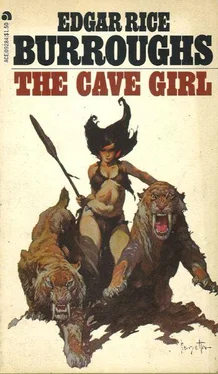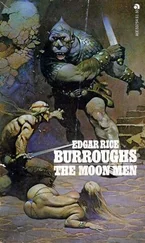Edgar Burroughs - The Cave Girl
Здесь есть возможность читать онлайн «Edgar Burroughs - The Cave Girl» весь текст электронной книги совершенно бесплатно (целиком полную версию без сокращений). В некоторых случаях можно слушать аудио, скачать через торрент в формате fb2 и присутствует краткое содержание. Жанр: Боевая фантастика, на английском языке. Описание произведения, (предисловие) а так же отзывы посетителей доступны на портале библиотеки ЛибКат.
- Название:The Cave Girl
- Автор:
- Жанр:
- Год:неизвестен
- ISBN:нет данных
- Рейтинг книги:5 / 5. Голосов: 1
-
Избранное:Добавить в избранное
- Отзывы:
-
Ваша оценка:
- 100
- 1
- 2
- 3
- 4
- 5
The Cave Girl: краткое содержание, описание и аннотация
Предлагаем к чтению аннотацию, описание, краткое содержание или предисловие (зависит от того, что написал сам автор книги «The Cave Girl»). Если вы не нашли необходимую информацию о книге — напишите в комментариях, мы постараемся отыскать её.
The Cave Girl — читать онлайн бесплатно полную книгу (весь текст) целиком
Ниже представлен текст книги, разбитый по страницам. Система сохранения места последней прочитанной страницы, позволяет с удобством читать онлайн бесплатно книгу «The Cave Girl», без необходимости каждый раз заново искать на чём Вы остановились. Поставьте закладку, и сможете в любой момент перейти на страницу, на которой закончили чтение.
Интервал:
Закладка:
“She loved Waldo,” he said simply.
“The brazen hussy!” exclaimed Mrs. Smith-Jones. “To dare love a Smith-Jones!”
“Come, come, Louisa!” ejaculated her husband. “Remember that she too is suffering—do not add to her sorrow. She loved our boy, and he returned her love.”
“How do you know that?”
“She has told me,” replied the man.
“It is not true,” cried Mrs. Smith-Jones. “It is not true! Waldo Emerson would never stoop to love one out of his own high class. Who is she, and what proof have you that Waldo loved her?”
“I am Nadara,” said the girl proudly, answering for herself. “And this is the proof that he loved me. He told me that this was the pledge token between us until we could come to his land and be mated according to the customs there.” She held out her left hand, upon the third finger of which sparkled a great solitaire—a solitaire which Mrs. John Alden Smith-Jones recognized instantly.”
“He gave you that?” she asked.
Then she turned toward her husband.
“What do you intend doing with this girl?” she asked.
“I shall take her back home,” replied he. “She should be as a daughter to us, for Waldo would have made her such had he lived. She cannot remain upon the island. All her people were killed by the earthquake that destroyed Waldo. She is in constant danger of attack by the wild beasts and wilder men. We cannot leave her here, and even if we could I should not do so, for we owe a duty to our dead boy to care for her as he would have cared for her—and we owe a greater duty to her.”
“I must be alone,” was all that Mrs. Smith-Jones replied. “Please take her away, John. Give her the cabin next to this, and have Marie clothe her properly—Marie’s clothes should about fit her.” There was more of tired anguish in her voice now than of anger.
Mr. Smith-Jones led Nadara out and summoned Marie, but Nadara upset his plans by announcing that she wished to return to the shore.
“She does not like me,” she said, nodding toward Mrs. Smith-Jones’s cabin, “and I will not stay.”
It took John Alden Smith-Jones a long time to persuade the girl to change her mind. He pointed out that his wife was greatly overwrought by the shock of the news of Waldo’s death. He assured Nadara that at heart she was a kindly woman, and that eventually she would regret her attitude toward the girl. And at last Nadara consented to remain aboard the Priscilla . But when Marie would have clothed her in the garments of civilization she absolutely refused—scorning the hideous and uncomfortable clothing.
It was two days before Mrs. Smith-Jones sent for her. When she entered that lady’s cabin the latter exclaimed at once against her barbarous attire.
“I gave instructions that Marie should dress you properly,” she said. “You are not decently clothed—that bear skin is shocking.”
Nadara tossed her head, and her eyes flashed fire.
“I shall never wear your silly clothes,” she cried. “This Thandar gave me—he slew Nagoola, the black panther, with his own hands, and gave the skin to me who was to be his mate—do you think I would exchange it for such foolish garments as these?” she waved a contemptuous gesture toward Mrs. Smith-Jones expensive morning gown.
The elder woman forgot her outraged dignity in the suggestion the girl had given her for an excuse to be rid of her at the first opportunity. She had mentioned a party named Thandar. She had brazenly boasted that this Thandar had killed the beast whose pelt she wore and had given her the thing for a garment. She had admitted that she was to become this person’s “mate.” Mrs. Smith-Jones shuddered at the primitive word. At this moment Mr. Smith-Jones entered the cabin. He smiled pleasantly at Nadara, and then, seeing in the attitudes of the two women that he had stepped within a theater of war, he looked questioningly at his wife.
“Now what, Louisa?” he asked, somewhat sharply.
“Sufficient, John,” exclaimed that lady, “to bear out my original contention that it was a very unwise move to bring this woman with us—she has just admitted that she was the promised ‘mate’ of a person she calls Thandar. She is brazen—I refuse to permit her to enter my home; nor shall she remain upon the Priscilla longer than is necessary to land her at the first civilized port.”
Mr. Smith-Jones looked questioningly at Nadara. The girl had guessed the erroneous reasoning that had caused Mrs. Smith-Jones’s excitement. She had forgotten that they did not know that Waldo and Thandar were one. Now she could scarce repress a smile of amusement nor resist the temptation to take advantage of Mrs. Smith-Jones’s ignorance to bait her further.
“You had another lover beside Waldo?” asked Mr. Smith-Jones.
“I loved Thandar,” she replied. “Thandar was king of my people. He loved me. He slew Nagoola for me and gave me his skin. He slew Korth and Flatfoot, also. They wanted me, but Thandar slew them. And Big Fist he slew, and Sag the Killer—oh, Thandar was a mighty fighter. Can you wonder that I loved him?”
“He was a hideous murderer!” cried Mrs. Smith-Jones, “and to think that my poor Waldo; poor, timid, gentle Waldo, was condemned to live among such savage brutes. Oh, it is too terrible!”
Nadara’s eyes went wide. It was her turn to suffer a shock. “Poor, timid, gentle Waldo!” Had she heard aright? Could it be that they were describing the same man? There must be some mistake.
“Did Waldo know that you loved Thandar?” asked Mr. Smith-Jones.
“Thandar was Waldo,” she replied. “Thandar is the name I gave him—it means the Brave One. He was very brave,” she cried. “He was not ‘timid,’ and he was only ‘gentle’ with women and children.”
Mrs. Smith-Jones hand never been so shocked in all her life. She sprang to her feet.
“Leave my cabin!” she cried. “I see through your shallow deception. You thoughtlessly betrayed yourself and your vulgar immoralities, and now you try to hide behind a base calumny that pictures my dear, dead boy as one with your hideous, brutal chief. You shall not deceive me longer. Leave my cabin, please!”
Mr. Smith-Jones stood as one paralyzed. He could not believe in the perfidy of the girl—it seemed impossible that she could have so deceived him—nor yet could he question the integrity of his own ears. It was, of course, too far beyond the pale of reason to attempt to believe that Waldo Emerson and the terrible Thandar were one and the same. The girl had gone too far, and yet he could not believe that she was bad. There must be some explanation.
In the meantime Nadara had left the room, her little chin high in the air. Never again, she determined, would she subject herself to the insults of Thandar’s mother. She went on deck. She craved the fresh air, and the excitement to be found above. The officers had been very nice to her. Stark was much with her. The man had fallen desperately in love with the half-savage girl. As she reached the deck after leaving Mrs. Smith-Jones’s cabin Stark was the first she chanced to meet. She would have preferred being alone with her sorrow and her anger, but the man joined her. Together they stood by the rail watching the approach of heavy clouds. A storm was about to break over them that had been brewing for several days.
Stark knew nothing of what had taken place below, but he saw that the girl was unhappy. He attempted to cheer her. At last he took her hand and stoked it caressingly as he talked with er. Before she could guess his intention he was pouring words of love and passion into her ears. Nadara drew away. A puzzled expression contracted her brows.
“Do not talk so to Nadara,” she said. “She does not love you.” And then she moved away and went to her cabin.
Читать дальшеИнтервал:
Закладка:
Похожие книги на «The Cave Girl»
Представляем Вашему вниманию похожие книги на «The Cave Girl» списком для выбора. Мы отобрали схожую по названию и смыслу литературу в надежде предоставить читателям больше вариантов отыскать новые, интересные, ещё непрочитанные произведения.
Обсуждение, отзывы о книге «The Cave Girl» и просто собственные мнения читателей. Оставьте ваши комментарии, напишите, что Вы думаете о произведении, его смысле или главных героях. Укажите что конкретно понравилось, а что нет, и почему Вы так считаете.








